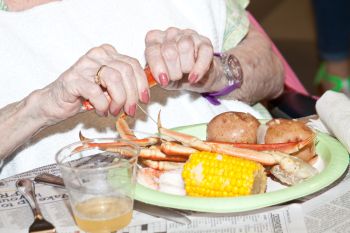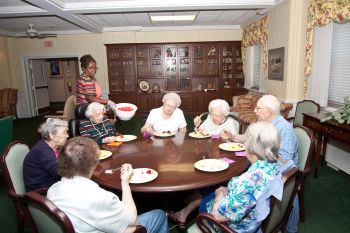Talking to a loved one about transitioning to a personal care residence
 Maybe you get scared after seeing an older loved one fall. Or your mom or dad is getting more than a little confused — not forgetting the keys but forgetting what they are for. Perhaps a former happy homemaker begins letting things go; the house is dirty, personal hygiene slips.
Maybe you get scared after seeing an older loved one fall. Or your mom or dad is getting more than a little confused — not forgetting the keys but forgetting what they are for. Perhaps a former happy homemaker begins letting things go; the house is dirty, personal hygiene slips.
Any of these could be signs that it’s time to begin a dialogue about the loved one’s options for entering a personal care residence or skilled nursing facility.
It’s never an easy conversation. But when a loved one’s health, safety and well-being are at stake, it’s time for caring, committed family members to broach the subject.
What follows are some strategies, tips and pointers for making that caring conversation not only a little bit easier — but a whole lot more effective.
The sage advice comes courtesy of two experts in the field of ensuring that aging individuals obtain the exact kind of care they need: Debbie Haas, Homeland Center’s director of skilled care and the Ellenberger Unit coordinator, which handles Alzheimer’s and dementia patients; and Ginger Sergott, Homeland Center’s director of personal care.
Getting past the guilt
 The first thing families considering any kind of residential care for their aging loved one need to know is that nobody has failed.
The first thing families considering any kind of residential care for their aging loved one need to know is that nobody has failed.
Seeking out a personal care residence or nursing facility is not tantamount to abdicating one’s responsibilities as a family caregiver. It isn’t a failing on the aging loved one’s part, either, that he or she simply can no longer live on their own. People get old. Health declines. And in a busy world full of many responsibilities, most families can’t take care of an aging loved one by themselves.
Far from being a sign of failure, the decision to seek out a personal or nursing care facility could be the best thing a family can do for a loved one in need of those services.
“Sometimes giving the best care to your family member isn’t actually giving them that care,” Homeland’s Debbie Haas reminds us. “It’s finding the best place where they can get that care. Sometimes, that isn’t at home. Doing the best for your family member isn’t always keeping them at home. Sometimes, transitioning to a care facility is the best thing you can do for them.”
Enlisting an ally: The family doctor
 Once a family has seen the signs of decline in an aging loved one and decided they can no longer live on their own, the next step is to convince the loved one that a change is needed. In this, it’s better not to go it alone.
Once a family has seen the signs of decline in an aging loved one and decided they can no longer live on their own, the next step is to convince the loved one that a change is needed. In this, it’s better not to go it alone.
First, all family members should be onboard, including any out-of-town siblings who might not be current on all the declining loved one’s care requirements. Bring them up to speed and inform them of the care options you are considering.
Then, enlist one more ally: The family doctor. Remember, in your loved one’s eyes, you’re their son or daughter. As much as you love them and want the best for them, your opinion might not carry much weight. Especially when it comes to such a life-changing decision.
But another opinion does count. And it carries much weight, especially among the older set: That of their family doctor. So bring the loved one’s primary care professional into the conversation. Have the “big talk” about transitioning into a care facility during a visit with the doctor. Ask the doctor to weigh in.
This should go a long way in getting your loved one onboard with this life-altering – but ultimately rewarding — transition.
Touring the facilities together
 You’re almost there. With the help of your loved one’s doctor, you’ve convinced them that transiting to a personal care or nursing facility is the right move for their health, safety and welfare – not to mention maximizing their social life.
You’re almost there. With the help of your loved one’s doctor, you’ve convinced them that transiting to a personal care or nursing facility is the right move for their health, safety and welfare – not to mention maximizing their social life.
Now, it’s just a matter of finding the right facility. This should be a quest that you take together. Narrow the search down to a handful of options, and then tour these finalist facilities together.
One step inside today’s personal care and nursing facilities, such as those at Homeland Center, will instantly dispel the outmoded mental images still conjured by the word, “nursing home.” Both you and your loved one will breathe easier once glimpsing this firsthand reality check. But begin your search early to avoid waiting lists at preferred facilities.
And allow your loved one to participate in every aspect of the facility selection, including staff interviews, understanding the care features and programs and outlining the finances, to the extent the person is able.
After all, it’s their life. And having their say should go a long way toward making the transition to a personal care or nursing facility a smooth one.
It’s the caring choice for all involved. And here at Homeland Center, we stand ready to help make it the right choice for your family and the loved you care about so deeply.




